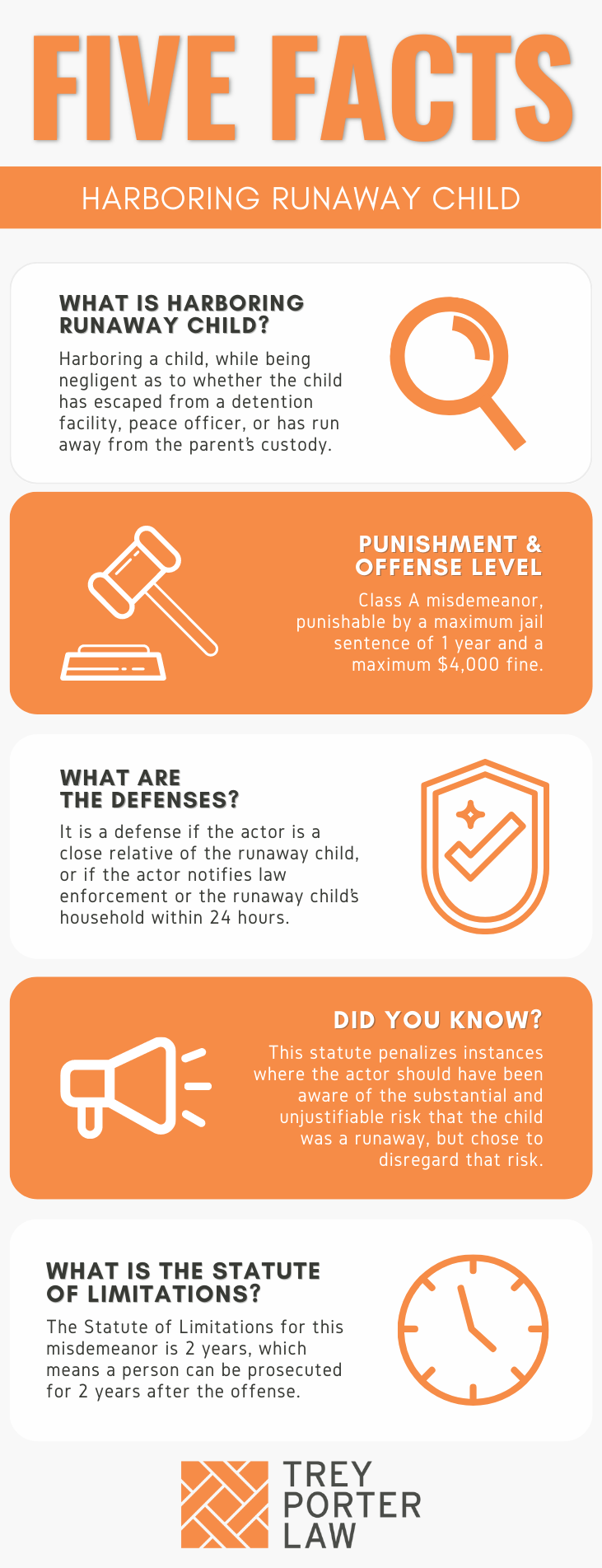WHAT IS HARBORING RUNAWAY CHILD IN TEXAS?
Texas law prohibits harboring a runaway child, which is giving shelter or refuge to a minor who has left home without permission, or escaped a detention facility or officer’s custody.
WHAT IS THE HARBORING RUNAWAY CHILD LAW IN TEXAS?
Tex. Penal Code § 25.06. HARBORING RUNAWAY CHILD.
(a) A person commits an offense if he knowingly harbors a child and he is criminally negligent about whether the child:
(1) is younger than 18 years; and
(2) has escaped from the custody of a peace officer, a probation officer, the Texas Youth Council, or a detention facility for children, or is voluntarily absent from the child’s home without the consent of the child’s parent or guardian for a substantial length of time or without the intent to return.
(b) It is a defense to prosecution under this section that the actor was related to the child within the second degree by consanguinity or affinity, as determined under Chapter 573, Government Code.
(c) It is a defense to prosecution under this section that the actor notified:
(1) the person or agency from which the child escaped or a law enforcement agency of the presence of the child within 24 hours after discovering that the child had escaped from custody; or
(2) a law enforcement agency or a person at the child’s home of the presence of the child within 24 hours after discovering that the child was voluntarily absent from home without the consent of the child’s parent or guardian.
(d) An offense under this section is a Class A misdemeanor.
(e) On the receipt of a report from a peace officer, probation officer, the Texas Youth Council, a foster home, or a detention facility for children that a child has escaped its custody or upon receipt of a report from a parent, guardian, conservator, or legal custodian that a child is missing, a law enforcement agency shall immediately enter a record of the child into the National Crime Information Center.
WHAT IS THE PENALTY CLASS FOR HARBORING RUNAWAY CHILD IN TEXAS?
Harboring a runaway child is a Class A misdemeanor, punishable by up to one year in county jail.
WHAT IS THE PUNISHMENT RANGE FOR HARBORING RUNAWAY CHILD IN TEXAS?
The punishment range for harboring a runaway child, a Class A misdemeanor, is up to one year in jail, and a maximum $4,000 fine.
WHAT ARE THE PENALTIES FOR HARBORING RUNAWAY CHILD IN TEXAS?
As an alternative to jail, a person may be placed on probation after a conviction, or deferred adjudication without a conviction, for up to two years.
WHAT ARE THE DEFENSES TO HARBORING RUNAWAY CHILD IN TEXAS?
The statute provides defenses to harboring a runaway if the accused is the child’s close relative, or notifies a parent, guardian, law enforcement, or the place from which the child escaped within 24 hours of the child leaving. An accused may also attempt to negate one of the elements the State must prove at trial, by arguing, for example, ignorance of the child’s age and runaway status.
- What if the person did not know the child was a minor or runaway? Texas law permits a conviction for harboring a runaway if the accused was criminally negligent as to the child’s age and runaway status. This means that a person who should have been aware of the substantial and unjustifiable risk that the child was a minor or runaway, but disregarded that risk, may be convicted of harboring a runaway.
WHAT IS THE STATUTE OF LIMITATIONS FOR HARBORING RUNAWAY CHILD IN TEXAS?
The limitation period for harboring a runaway child, a Class A misdemeanor, is two years.
HARBORING RUNAWAY CHILD IN TEXAS
It is against Texas law to aid, encourage, or assist another in committing a crime. Harboring a runaway child is no different. The legislature, in furtherance of the overarching goal of protecting children, and to discourage assisting others in criminal activity, created the independent crime of harboring a runaway child.
TEXAS HARBORING RUNAWAY CHILD COURT CASES
The case law regarding harboring a runaway child in Texas illustrates situations in which a person should be aware of the child’s runaway status.
- In Jubb v. State, the defendant and minor met online, and the minor expressed a desire to move cities to live with the defendant. After the minor traveled to the defendant’s house, the defendant suggested he call his mother, but allowed him to stay. Over 48 hours later, the defendant notified police, and argued at trial he thought the minor’s mother gave the minor permission to stay with the defendant.The jury found him guilty of harboring a runaway child, and the appellate court affirmed. The defendant knew and should have known about the minor’s runaway status, and notified law enforcement beyond the 24-hour window.

















